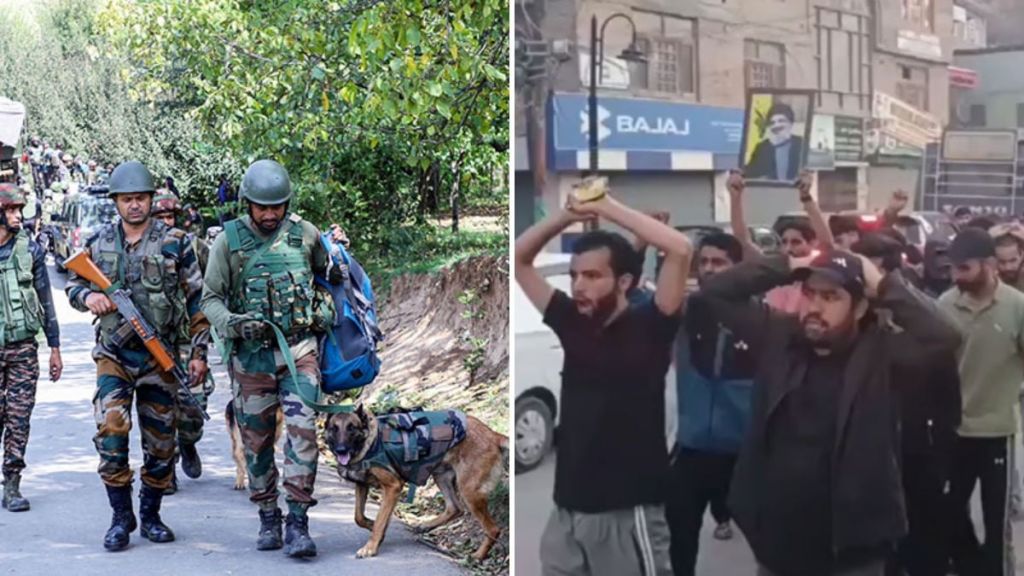
Jammu: In Jammu and Kashmir, a striking juxtaposition of events unfolded on Sunday, illustrating the region’s persistent volatility amid its electoral processes. Even as the intense campaigning for the third and final phase of polling came to an end, a terrorist was killed during a fierce encounter with security forces in the Kathua district. Meanwhile, anti-Israel protests erupted across Kashmir, marking a second consecutive day of unrest over the killing of Hezbollah leader Hassan Nasrallah in Lebanon.
The contrast between the two realities—one of democratic engagement, the other of violence and international protest—highlights the complexities of the Union Territory’s socio-political landscape. As political leaders wrapped up their high-pitched campaigns for the Assembly elections, security personnel were still engaged in ongoing counter-terrorism operations in various districts.
About The Kathua Encounter
In Kathua, A terrorist, suspected to be linked to the Jaish-eMohammad (JeM), was gunned down after a prolonged gunfight in the remote village of Kog-Mandli. The operation, which began late Saturday, also resulted in the tragic death of Head Constable Bashir Ahmad and injuries to two other officers— Deputy Superintendent of Police Sukhbir Singh and Assistant Sub-Inspector Niaz Ahmad.
#WATCH | Jammu, J&K: Last respects paid to J&K Police Head Constable Bashir Ahmed who lost his life during an encounter in the Mandli area in Kathua, yesterday. pic.twitter.com/TQ0oM0N023
— ANI (@ANI) September 29, 2024
About The Jammu & Kashmir Assembly Elections 2024
The current Assembly elections, the first since the abrogation of Article 370 in 2019, are a key moment for Jammu and Kashmir’s future political landscape. Campaigns were fierce and emotional, but in some areas of Kashmir, they were paused in solidarity with the broader geopolitical tensions playing out in the Middle East. PDP President Mehbooba Mufti and other political leaders canceled their events in protest against Nasrallah’s killing, demonstrating how international issues often reverberate in the Valley, adding layers to its already complicated political scenario.
Anti-Israel Protests
In stark contrast to the election fervor in Jammu, anti-Israel protests continued for a second day in various parts of Kashmir. Protestors poured out onto the streets in places like Magam and Zadibal, holding black flags and chanting anti-Israel and anti-US slogans. The protests were largely peaceful, though tensions were high, and security forces remained on alert to prevent any violence.
#WATCH | A protest march was held in Jammu & Kashmir's Budgam against the killing of Hezbollah chief Hassan Nasrallah by the Israel Defence Force (IDF). pic.twitter.com/EhTYAMFKRd
— ANI (@ANI) September 28, 2024
Cancelling my campaign tomorrow in solidarity with the martyrs of Lebanon & Gaza especially Hassan Nasarullah. We stand with the people of Palestine & Lebanon in this hour of immense grief & exemplary resistance.
— Mehbooba Mufti (@MehboobaMufti) September 28, 2024
The protests were in response to Israeli airstrikes that killed Hezbollah leader Hassan Nasrallah in Lebanon. Political leaders like Mehbooba Mufti expressed solidarity with the people of Palestine and Lebanon.
“I stand with the people of Palestine & Lebanon in this hour of immense grief & exemplary resistance,” she posted on social media, suspending her campaign in light of the tragic events in the Middle East. The demonstrations disrupted daily life in Srinagar, causing traffic jams in several parts of the city. While police forces maintained a heavy presence, the protests served as a reminder of how regional and international politics continue to shape the everyday lives of Kashmiris.